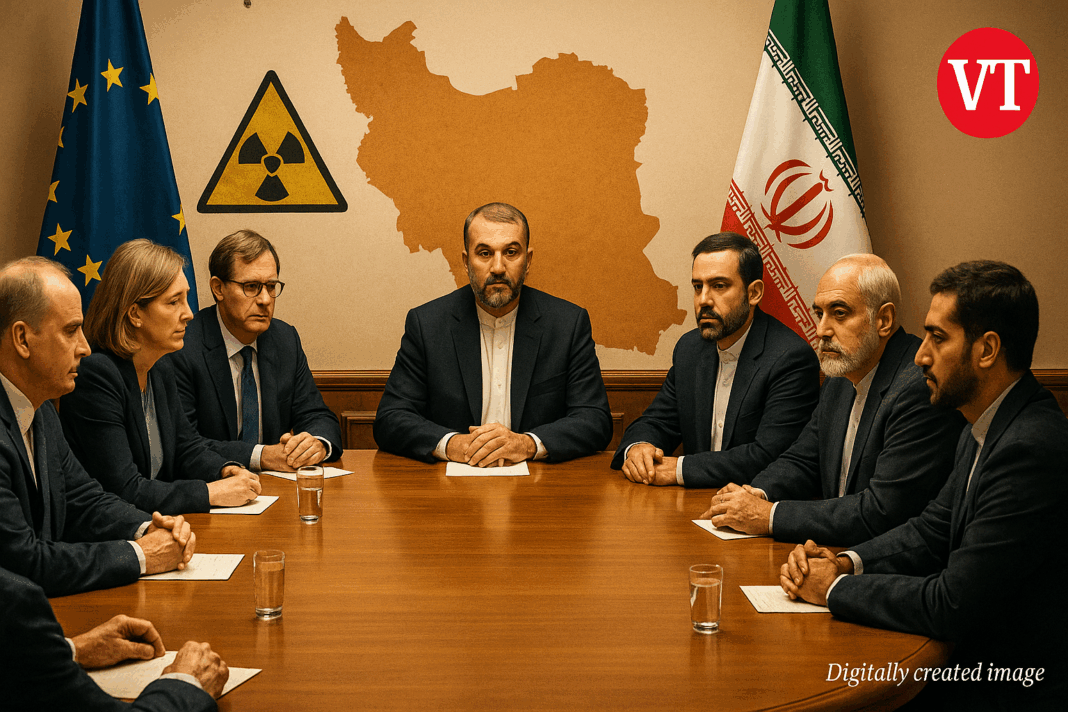- European and Iranian envoys have resumed nuclear talks in Istanbul, the first since the June conflict between Iran and Israel.
- The E3—UK, France, and Germany—may delay the “snapback” sanctions if Iran cooperates with IAEA inspections.
- Iran demands guarantees against U.S. and Israeli military action during negotiations.
- The U.S. is not participating directly in the Istanbul talks due to its 2018 exit from the JCPOA.
- A decision on sanctions is expected by late August if no diplomatic progress is made.
The Big Picture
European and Iranian diplomats gathered in Istanbul this week in a renewed attempt to revive nuclear diplomacy following a tense summer of military escalation in the Middle East. This marks the first formal round of discussions since June’s 12-day conflict between Iran and Israel, during which the United States also conducted airstrikes on Iranian nuclear sites.
According to Newsweek, the resumption of talks has raised hopes of de-escalation even as the E3—comprising the United Kingdom, France, and Germany—considers reimposing United Nations sanctions lifted under the 2015 Joint Comprehensive Plan of Action (JCPOA). The so-called “snapback” could be delayed, officials say, if Iran cooperates with the International Atomic Energy Agency (IAEA) and commits to meaningful diplomacy.
What’s New
European diplomats have proposed a temporary extension of the sanctions deadline, contingent on Iran’s willingness to resume full cooperation with international inspectors and curb its nuclear activity. Tehran, in turn, has insisted on guarantees of non-aggression during talks.
One of the major concerns is Iran’s stockpile of enriched uranium. Western officials say Iran has over 400 kilograms of uranium enriched to 60 percent purity—just below weapons-grade—raising alarms in both Washington and European capitals.
Iran has suspended its cooperation with the IAEA following recent military strikes and insists its nuclear program is peaceful and within legal parameters.
What They’re Saying
Iran’s Deputy Foreign Minister Kazem Gharibabadi published a statement on X (formerly Twitter), emphasizing Iran’s negotiating terms:
در جریان سه روز حضور اینجانب در سازمان ملل متحد در نیویورک، رایزنی ها و برنامه های مختلفی انجام شد:
— Gharibabadi (@Gharibabadi) July 24, 2025
1. حضور در نشست شورای امنیت به ریاست معاون نخست وزیر و وزیر امور خارجه پاکستان و سخنرانی درخصوص تجاوز رژیم صهونیستی و آمریکا علیه کشورمان، پاسخ قاطع ایران و تاکید بر ارائه پاسخ…
Meanwhile, President Masoud Pezeshkian said Iran is “prepared for another war,” while reiterating the country’s nuclear program complies with international law.
From the U.S. side, State Department spokesperson Tammy Bruce said, “The ball is in their court. The Iranian leadership has a window of opportunity to choose a path of peace and prosperity for their people, and we are also ready to talk directly to the Iranians. However, we are also closely coordinated with our E3 partners.” — as quoted by Newsweek.
Washington Watches From the Sidelines
The United States is not participating in the Istanbul round of talks due to its withdrawal from the JCPOA in 2018 under then-President Donald Trump. While indirect talks were held earlier this year, a sixth round was canceled following Israeli strikes on Iranian nuclear and military installations, which escalated tensions and shifted the momentum away from Washington.
What’s Next
If Iran agrees to re-engage with the IAEA and show tangible commitments to diplomacy, the E3 may delay the reinstatement of sanctions. However, absent clear progress, European nations are prepared to trigger the snapback clause before the end of August, setting the stage for a possible diplomatic crisis.
Khamenei Declares Iran’s Strength After Zionist Conflict, Warns U.S. of Bigger Blows
Opinion: Trump’s Nuclear Gamble with Iran
Follow Virginia Times for regular news updates. Stay informed with the latest headlines, breaking stories, and in-depth reporting from around the world.
A global media for the latest news, entertainment, music fashion, and more.














